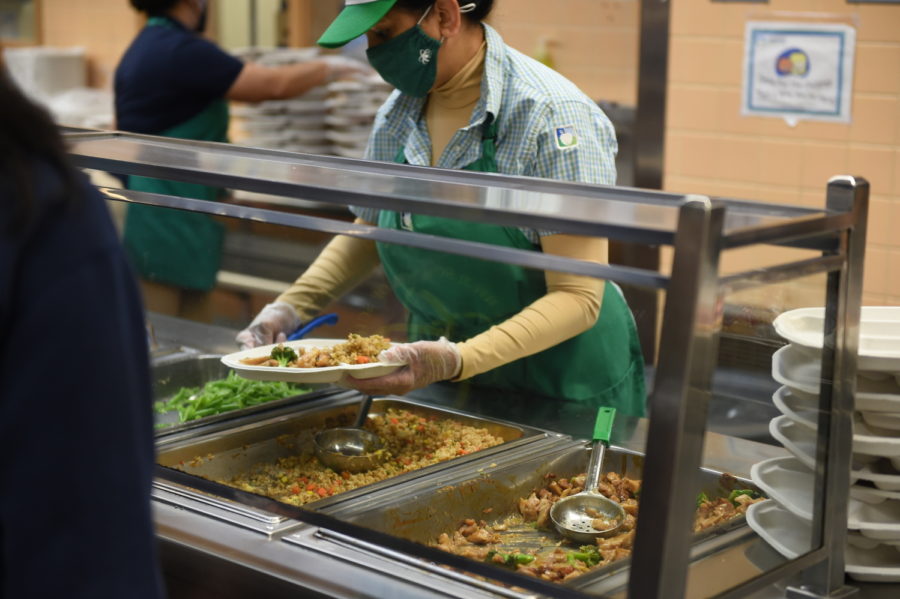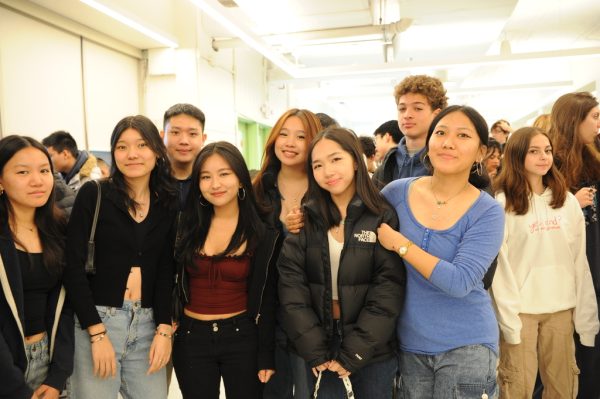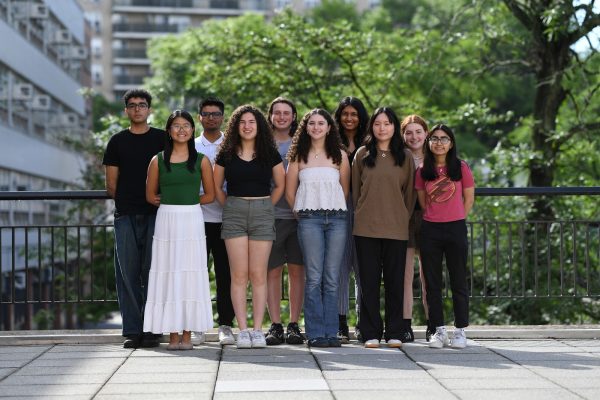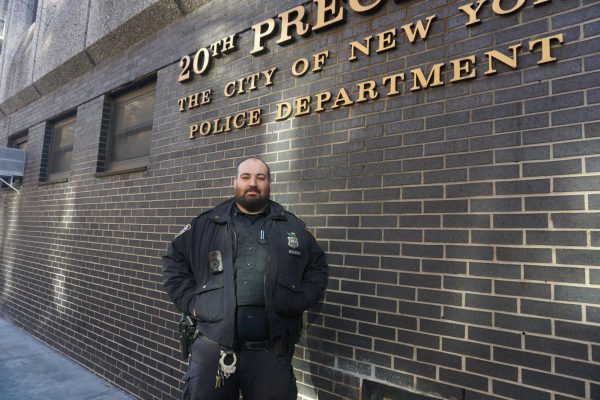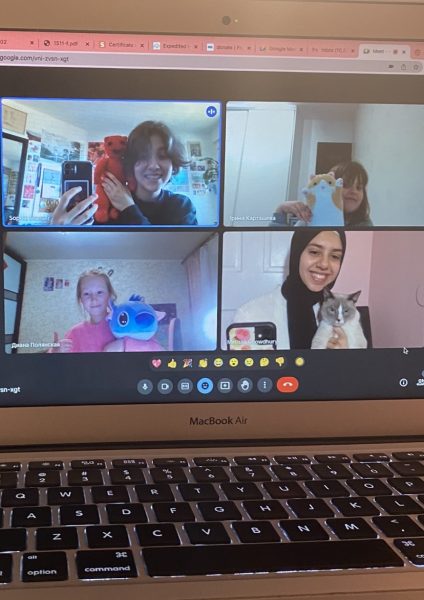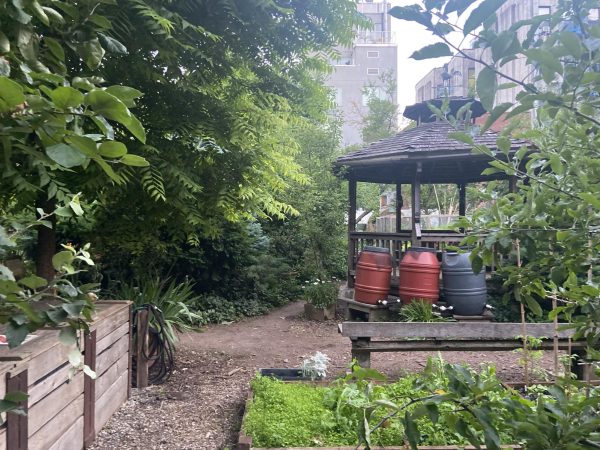An Appreciation of the Food Service Workers at Bronx Science
An in depth profile of some of our food service workers at Bronx Science who provide us with nutritious meals day in and day out.
The bell has just rung. Bodies flow into the cafeteria like a river. Clamoring voices fill the brightly lit space, discussing tests and homework, movies and songs, current events and favorite colors. A line of students quickly forms from the kitchen, awaiting the door’s grand opening, so that they can each rush in and get their fill. As the line shrinks, students survey the options for the day and make their decisions. Meeting them at the end of the line are the Bronx Science food service workers, who work in the Office of Food & Nutrition Services (OFNS) with the New York City Department of Education. They bustle about the refrigerators and ovens with trays of roasted chicken, sandwiches, rice, vegetables, and fruit. With bright smiles and a readiness to serve that puts a smile on Bronx Science student faces, they serve students their requested options and bid them goodbye with a cheerful comment of “Enjoy your lunch!”
The food service workers start their day early, arriving at the kitchen as early as 7:00 a.m. to prepare and serve breakfast. Options range from pre-made reheatable items, like muffins, yogurt, and bagels, to dishes they make themselves the night before, like oatmeal. “It’s a lot of preparation,” said the assistant food service worker, Ms. Elena Ginocci, describing how one oatmeal recipe takes up a whole bulk box of oats.
The clock does not stop there. While a few food service workers serve breakfast during the first few periods of the day, the rest work diligently in the kitchen throughout the whole morning, cooking the day’s lunch. A few of them cook “satellite meals” — breakfasts and lunches that are transported to a nearby high school without a kitchen. When the fourth period bell rings, some workers bring out the food and serve the long lines of students while others continue to cook and prepare for the next few periods.
Once all or most students have been served, the food service workers bring the trays back into the kitchen to be filled up again while they cook for the next period, occasionally bringing out a bagged lunch for a student who shows up late. Once the next lunch bell rings, the process repeats, and again for the next two lunch periods.
At the end of 7th period, the food service workers return to the kitchen and clean up, which can be just as tiring as cooking. When that is done, some stay to prepare breakfast for the next day, like oatmeal, while others pack up and get ready to leave. At around two in the afternoon, most of the workers head out to their lives beyond the cafeteria.
Ms. Elena Ginocci and Ms. Jacklin Gonzalez each travel home to Pelham Bay, a quaint neighborhood in the East Bronx. Ginocci returns to her husband, occasionally picking up her granddaughter from Manhattan. Gonzalez arrives to an empty home — just the way she likes it. While she has family nearby in Pelham Bay, Gonzalez enjoys relaxing on her own. Ms. Karina Santos — a newer cook to Bronx Science’s kitchen — travels nearby Bronx Science to tutor two kids in language, whom she has been tutoring since they were toddlers.
Ms. Ginocci has been working for the Bronx Science cafeteria for fifteen and a half years, and was appointed as Assistant of the food service workers this past year, in lieu of retiring. She was born in Italy, near Naples, and grew up there until she was seven years old, when she immigrated to the States with her family for job opportunities. Ms. Ginocci lived in Pennsylvania, near Pittsburgh, where she finished school and found her future husband. They married and have had two kids. In 1997, Ginocci moved to the Pelham Bay neighborhood in the Bronx, New York City, for work. She took up working in school cafeterias to make extra income for her family, and eventually ended up at Bronx Science, where she has enjoyed working. The students, she said, make Bronx Science stand out from the other schools she has worked at.
Ginocci is a mother to three children, and a recent grandmother. Her oldest daughter is a speech pathologist and mother who will be attending medical school in the fall. Her second oldest works at ConEdison, and her youngest is a current student at Georgetown — in fact, her youngest daughter is good friends with some Bronx Science alumni currently attending Georgetown! Two of her daughters attended Preston High School in the Throgs Neck area of the Bronx, while the third attended high school in Manhattan.
Close to Elena is Ms. Jacklin Gonzalez, another cafeteria worker who has been with the Bronx Science administration for the past eight years, and also lives in Pelham Bay. Gonzalez was born in Manhattan and moved to the Grand Concourse region of the Bronx at seven years old, to be around her extended family.
“The Grand Concourse was beautiful, up until the 60s,” she reminisced. Gonzalez attended high school in the Bronx, and then went on to become a hairdresser for the next 30 years. After growing tired of that, she began working for public school cafeterias, first at DeWitt Clinton, and then at Bronx Science.
Ms. Gonzalez is a hard and busy worker in the kitchen. Her work day starts at 7:00 a.m., consisting of breakfast preparation and service, followed by packaging satellite meals for other schools who do not have their own kitchen. The cooks tend to rotate who makes satellite meals, but if Ms. Gonzalez is available for the task, she will do it.
“I’m not here to do nothing, I’m here to work,” she said.
Her succeeding hours consist of lunch prepping and serving with the rest of the cooks: following recipes, cooking the defrosted chicken thighs, transferring empty and full trays, chopping up vegetables, as well as cleaning up after each period, and setting up for the next. After a busy day, she gets to go home to her own condominium in Pelham Bay, where she enjoys relaxing and unwinding in the peace of her solitude — a respite from the hectic energy of the school cafeteria.
Ms. Gonzalez is excited to retire after this year and extend her relaxation time into the rest of her life. When asked what she would do after retirement, she cheerily replied, “Nothing. For a whole year. Then, I’m going to babysit!”
Ms. Karina Santos, a new member of the food service workers, has the luxury of a later arrival time. She shows up at 9:30 a.m. and is tasked with serving. Ms. Santos is currently subbing for another worker who has been out for a few weeks. Substitutes and new workers have to complete 120 days of training before being considered a permanent employee, and Ms. Santos is nearly halfway there.
Ms. Santos was born in Washington Heights, and attended elementary and middle school there. She graduated from The High School of Fashion Industries (FIT) in 2003, and then attended the Fashion Institute of Technology until 2006. After high school, she was employed in a patterning job for Tommy Hilfiger, who would occasionally come into her workplace with, Oscar de la Renta, another star designer, to view the designs. Fashion design runs in the Santos family, so it was an easy pathway for her to take.
“I would get so excited seeing them!” she said, enthusiastically recalling her memories of the renowned designers strolling about her and her coworkers as they worked.
When fashion designing finally tired her out, and after she had her daughter, Ms. Santos took the opportunity to pursue her passion in becoming a food service workers. She got her certificate at Hostos Community College and proceeded to work in a school cafeteria with preschool-aged special needs kids. Working with special needs kids was a struggle at first, but she eventually learned to be patient, as well as the processes that were most effective in communicating with, teaching, and supervising them.
Ms. Santos’ personal experience in high school why she had such concern for her own students’ well-being. She had a mostly positive experience in high school, highlighted by athletics. She was the captain of her track and volleyball teams. She enjoyed track the most, where she racewalked, threw shot put, and ran the 4x100m relay.
Ms. Santos has been working with kids since she was fourteen years old: in middle school, she taught younger students how to sew. Now she has a twelve-year old daughter, fifteen nieces, and is adopting four children!
“I’m going to be a foster parent!” she exclaimed, beaming.
Ms. Santos’ resiliency sees no end. She is currently in the process of studying for her Teacher’s Assistant Exam to become a teacher. Her dream is to eventually open a business that provides multiple services to youth of all age groups: to resume helping older students, giving sewing instruction to younger students, and proving day care to toddlers and infants.
“I want it to all be together. I have my degree in business administration and counseling, and my fashion design experience,” Santos said.
When asked about her experience in school cafeterias, she explained that she has been a manager for two restaurants before — a Taco Bell and a Cambodian Restaurant — so, knowing food service well, she figured a being a food service worker could be a good way to supplement her income.
I only interviewed Ms. Santos a week before she was moved to another school cafeteria, but she seemed to really like Bronx Science. “I wish I could stay in this school,” she said, when asked about how it was going so far.
Most food service workers at Bronx Science agree that the students at Bronx Science are the nicest and most well-behaved students they have served. Many have worked in other schools where the students are less well behaved. The food service workers enjoy having small conversations and getting to know individual students too. Ms. Ginocci recalls a group of seniors from four years ago whom she would talk with frequently. Ms. Santos is always vocal with students, asking how they are and how their day is going.
Students tend to reciprocate and appreciate that kindness, especially on difficult, stressful, or gloomy days.
“In a school like Bronx Science, a small thing like that really does make a difference,” said Randall Dominguez ’22, when recalling how the food service workers would happily stack his breakfast plate with two or three muffins upon his timid request.
“Especially in our fast paced environment, just having that little bit of support just makes all the difference,” said Ellington Fagan ’22, echoing Randall’s sentiment.
Angel Prabakar ’22 remembered getting sick one day, and going to the cafeteria before leaving school, during eighth period — after all the lunches were over. She asked a lunch aide if they had anything left.
“She immediately got me food and even brought me an extra helping, and said ‘You have to eat more or you’re going to get more sick.’” Prabakar described how cared for she felt, taking to heart the kindness of the food service worker who displayed such concern for her health.
Aananadita Chowdury ’22 presented a different perspective on the food service workers’ care and work. “From a spiritual perspective, if your parents or guardians who feed you three times a day are revered so much, and the food service workers feed us breakfast, lunch, and sometimes after school snacks, they should be revered too. They’re feeding us so much, taking care of us, so that we don’t have to think about it, and we can focus on our school work, consequently.”
Bronx Science culture is all about resiliency, perseverance, and diligence. Although it gets easily overlooked, our achievements are not possible without nourishment. In fact, amid the rigorous culture at Bronx Science, forgetting about eating in lieu of studying and finishing assignments, and even skipping meals to maximize work time, are common. Thus, the food service workers and their essential help in providing nourishment to us are even more essential.
With their care for both the mental and physical health of students, it is evident that our food service workers are an essential component of Bronx Science.
“From a spiritual perspective, if your parents or guardians who feed you three times a day are revered so much, and the food service workers feed us breakfast, lunch, and sometimes after school snacks, they should be revered too. They’re feeding us so much, taking care of us, so that we don’t have to think about it, and we can focus on our school work, consequently,” said Aananadita Chowdury ’22.
Josephine Kinlan is a Copy Chief for ‘The Science Survey.' She has always enjoyed literacy surrounding current events, since grade school, and has found...

